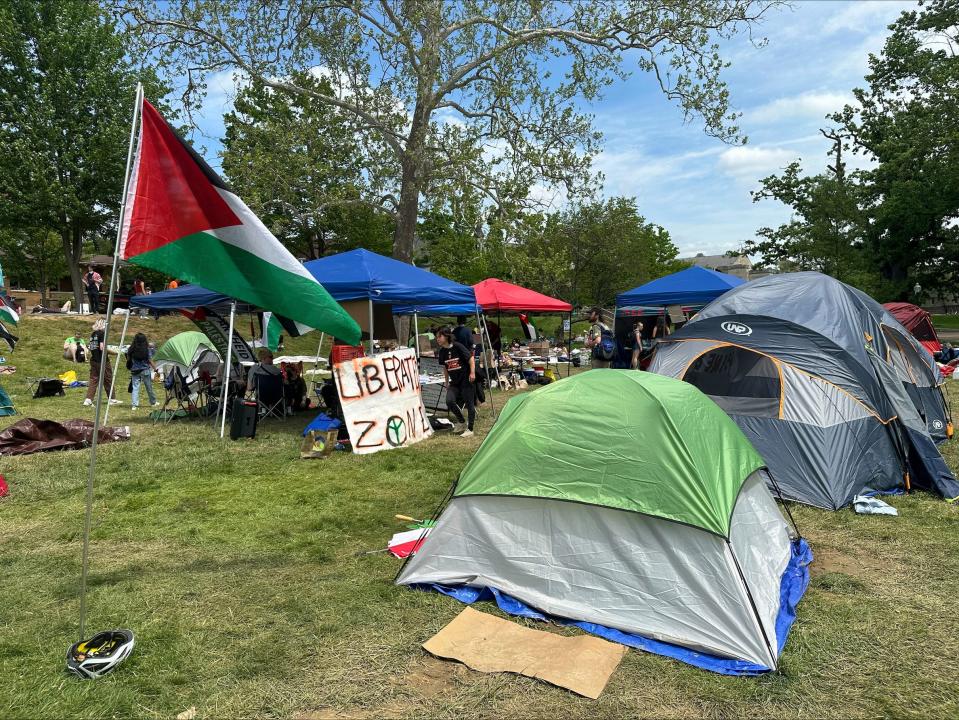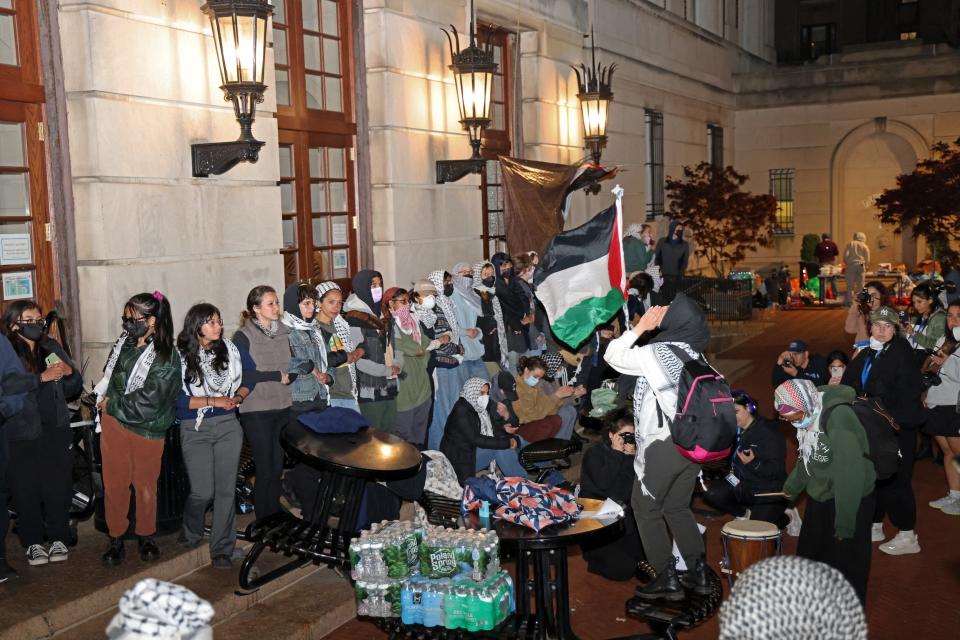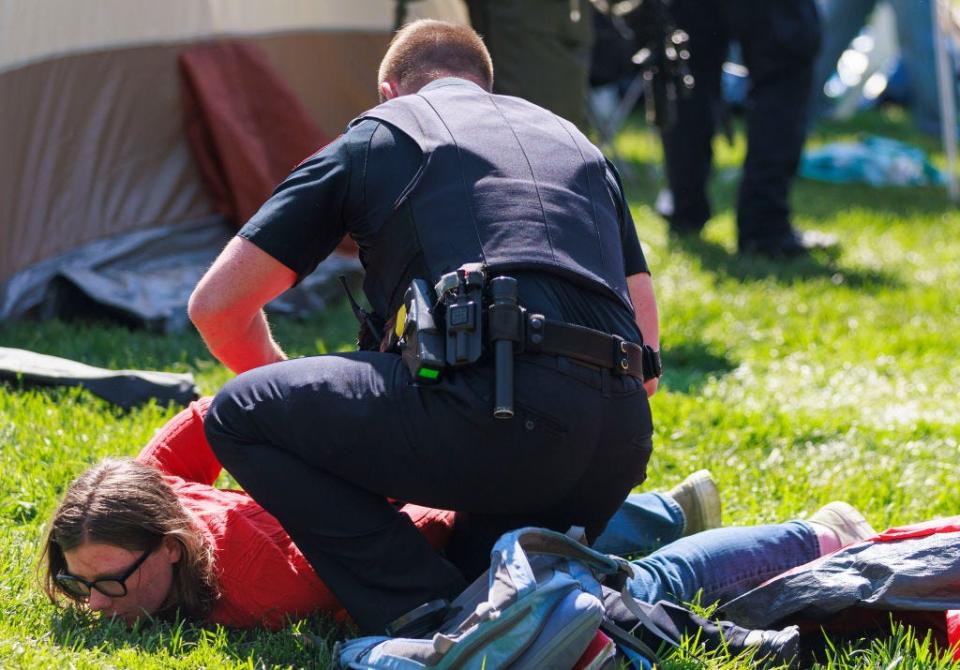Gen Z students lead pro-Palestine demonstrations while their Boomer professors see parallels to past protest eras
Students and their professors are asking universities to divest from Israel.
At Indiana University, protesters say they've been met with a militarized response from police.
Professors say the current protests share stark differences and chilling similarities to past ones.
On April 25, a day after Indiana University made a controversial change to its protest policies, students built an encampment on the school's Dunn Meadow.
The meadow had been designated a free speech lawn since 1969, when the school experienced increased student protests over tuition hikes, anti-Black racism, and the Vietnam War.
Multiple generations of activists are now gathered on that same ground to protest Israel's war on Gaza — though the police presence was much different than what protesters before had known or experienced, per people who spoke to Business Insider.
The decision made on April 24 required that the "temporary or permanent installation of structures in Dunn Meadow (including, but not limited to posters, tents, etc.) at any time must be approved in advance by the university and, if approved, adhere to the guidelines provided by the university," according to a statement from Indiana University President Pamela Whitten.
The university enforced its policy against the encampments by calling police to arrest demonstrators who did not comply with the rule against "unapproved temporary or permanent structures," it said in a press release.
A statement from Whitten shared with Business Insider said the policy change was made to "balance free speech and safety in the context of similar protests occurring nationally."
The change resulted in what Barbara Dennis, a 64-year-old professor at Indiana University's School of Education and self-described "longtime peace activist," called a "militarized" police response.

She joined the campus protests on April 25 alongside her husband, an IU staff member. Within hours, Dennis was detained — and is now appealing a one-year ban from entering the university campus.
Dennis said the response was unlike anything she had witnessed on campus since she began teaching there in 2001 and went against everything she knew beforehand about the university's history.
From Vietnam to the Israel-Hamas War
When Dunn Meadow was established in 1969, official university policy dictated that overnight encampments were not allowed. Despite this, Dennis said the policy had never been enforced until now.
She said that during the Vietnam War era, South African Apartheid in the 1980s, and the first Gulf War, protest tents were left up in the meadow, sometimes for months.
Dennis described similar scenes while on campus witnessing the Iraq War protests and the Occupy Wall Street movement. She said a kitchen was erected during protests, and people slept there overnight.
"It's not just that the militarization is new," Dennis told BI, "IU had previously allowed people to camp in the meadow in peaceful protests without invoking its own policy on overnight tents."
IU did not respond to questions about enforcing its overnight tent policy in the past and pointed Business Insider to public statements from Whitten.
'We know this kind of thing has happened on college campuses'
Videos and images from college campuses across the nation over the past weeks show a mass police presence and dozens or hundreds of demonstrators being detained. In the US, over 2,000 demonstrators have been arrested so far, The New York Times reported.
At Columbia and City College of New York, 300 protesters were arrested in one night on April 30.
As students face university and police responses to their protests, school faculty and staff are also taking a stand and, in some cases, protecting students by getting in front of the police or forming human chains.

Dennis said that when she was arrested, she and two other faculty members tried to stand between students and police. Though she said that none of the protests on college campuses that she's ever participated in or witnessed have required professors to protect students similarly, she said that college campuses have sometimes experienced worse violence.
"We just passed that anniversary of the Kent State massacre," Dennis told BI. "We know this kind of thing has happened on college campuses. College protests haven't been completely free of this kind of military police response."
On May 4, 1970, four unarmed students at Kent State University were killed and nine others were injured when the Ohio National Guard opened fire on protesters opposed to the expansion of the Vietnam War. None of the guardsmen received criminal convictions for their actions.
The Indiana University Police Department did not immediately respond to a request for comment from BI.
Passing the torch to Gen Z
Bryce Greene, a Gen Z graduate student at IU who helped found the school's Palestine Solidarity Committee, helped to launch the encampment to "protest the genocide and, precisely, of our school's complicity in it," he told Business Insider.
The main goals of the encampments, Greene said, are to get the university to disclose any investments in Israeli companies or weapons manufacturers and divest from them.
Some students demand the school cut ties with the Naval Surface Warfare Center in Crane, Indiana. IU's STEM departments have research partnerships with the facility, which helps in the research and development of warship and submarine systems. The University also announced late last year that it had invested $111 million in partnership with the NSWC to advance "strategic initiatives focused on advancements in microelectronics, nanotechnology, artificial intelligence, machine learning and cybersecurity" for defense purposes.
Greene is also appealing a five-year ban on campus after his own arrest on April 27.
Representatives for IU did not immediately respond to questions asking why there were discrepancies in bans, but they pointed Business Insider to statements about campus safety made by Whitten. The ACLU of Indiana is suing the campus, claiming these bans violate free speech rights.

While on campus, however, Greene said he and other students witnessed faculty shielding students from police and offering help to students who lost housing due to school suspensions.
Dennis said that in her holding cell, she helped comfort students as they comforted her back. She sang "old hippie songs and freedom ballads" to herself after everyone else was booked.
"I knew things were going to be OK, Dennis said. "I was the oldest person arrested that day."
Greene said many faculty members feel similarly to students and have some institutional power to help advance the cause.
"Faculty are typically more permanent fixtures of the institution. If they are upset, well, that causes long-term problems that can't be swept under the rug for a year or two," Greene said.
'How can we ignore what's going on and consider ourselves educators?'
Greene and Dennis are both supporting the student encampment following their arrests. Dennis still returns to the encampment — she received a stay on her ban as part of her appeal — and encourages other educators to participate in the student-led movement.
"I'm unsupportive of war as an answer to any sort of human or ecological problem, I think we need to push our moral and intellectual capabilities to really solve our problems in peaceful ways," Dennis told BI.
The current student protests have the fixtures of something from the Vietnam War era: student conversations on blankets, an outdoor library, and teach-ins by university faculty. At the IU encampment, Dennis is participating in a teach-in herself.
"UNICEF has said that Palestine is the worst place in the world to be a child," Dennis said. "I mean, how can we ignore that and consider ourselves educators? That just doesn't seem fathomable to me."
Read the original article on Business Insider

